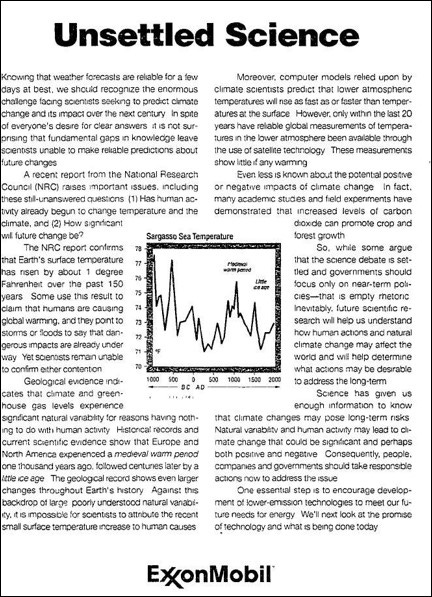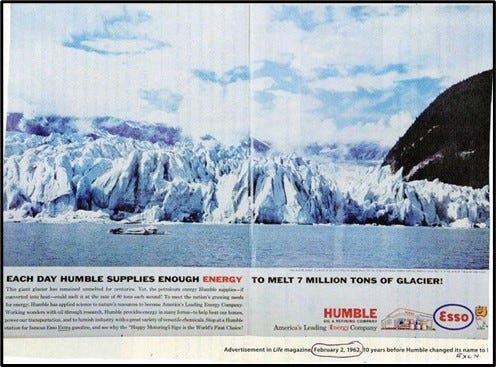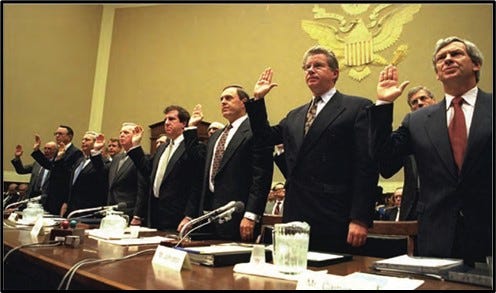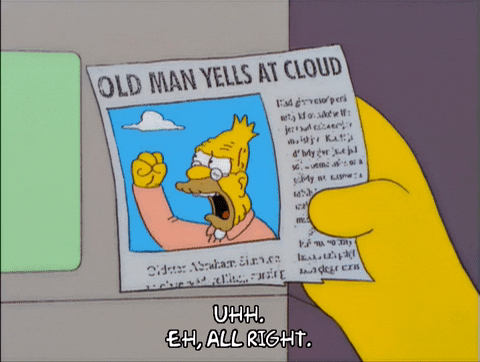"You either die a hero or live long enough to see yourself become the villain."
(Bruce Wayne)
In 1994, U.S. lawmakers summoned the CEOs from seven of the world’s largest tobacco manufacturers to Washington D.C.
The “invitation” was not a friendly one.
The objective of the hearing was to flesh out the extent to which tobacco companies understood the negative health impacts associated with smoking cigarettes. More specifically, whether those companies have knowingly misled their customers about the addictive nature and carcinogenic properties of their products.
At the hearing, the group collectively denied that nicotine was addictive. This was obviously a lie.
In the years that followed, the less-than-honest testimony delivered by the group of seven would land them all in the crosshairs of perjury charges. Amidst the ensuing investigations, each one would eventually step down from his high-paying post.
The hearing represented a turning point in the public's perception of big tobacco companies. It was also a big win for the politicians involved in the hearings.
Never in history had it been more clear that cigarettes were bad news.
Now, let’s fast forward to October 2021.
Two weeks ago, the executives from four of the world's largest oil producers testified before the House Oversight Committee. ExxonMobil, Chevron, BP, and Shell were all in virtual attendance for the day-long event.
It came as no surprise that media organizations seized on the opportunity to draw comparisons between cigarettes and oil. Today, given the role that oil plays in exacerbating climate change, it seems that in the eyes of many, the oil industry is as bad as tobacco. Or maybe even worse.
Unfortunately, that perception doesn't do justice to the vital role that oil continues to play in our global energy system.
This week's edition has four sections:
🚬 Black Gold & Cancer Sticks
📰 Climate Change Disinformation
🧊 On An Unrelated Note
📈 The Solution for Higher Prices
🚬 Black Gold & Cancer Sticks
U.S. Congressman Ro Khanna, a California Democrat, kicked off the recent hearing by presenting the attending companies with this ultimatum:
"You can either come clean, admit your past misrepresentations and ongoing inconsistencies, and stop supporting climate disinformation. Or you can sit here in front of the American public and lie under oath."
His statement made it clear that there was little doubt in his mind that oil companies have propagated climate change disinformation in the past. I can only imagine that he was hoping for the attending CEOs to perjure themselves once again.
This brings me back to the comparison between oil and tobacco. Here is a sampling of media headlines from around the time of the hearing:
The Guardian - Big tobacco got caught in a lie by Congress. Now it's the oil industry's turn
E&E - Lawmakers study Big Tobacco perjury before Big Oil showdown
NPR - Oil companies face 'big tobacco moment' in Congress over their climate policies
.
As the public has grown increasingly concerned with climate change, the fossil fuel industry has become a well-worn and widely adopted punching bag. Drawing parallels between oil and tobacco reinforces the negative public perception of the oil industry as a whole.
But I struggle to appreciate the disdain for fossil fuels.
Unlike cancer sticks, black gold continues to play an important role in powering the global economy. That’s not to say that there aren’t drawbacks to fossil fuel consumption; oil is a carbon-intensive energy source. But there are two sides to every coin.
According to BP, fossil fuels represented ~85% of total global primary energy consumption in 2020. Without oil, life would look very different.

It is unlikely that we see a material decline in our dependence on oil anytime soon. Meaning that we still need global oil companies, including those questioned by U.S. politicians last month, to continue producing oil.
The alternative, where oil production falls more quickly than global demand, will inflate energy prices. While that scenario could accelerate a transition to cleaner energy sources, it might also result in a slowdown in economic growth and a rise in energy poverty globally.
It might be politically advantageous in the short term to villainize the oil industry. But voicing broad, negative criticism does little to reduce our reliance on oil and other fossil fuels.
Like an old man yelling at a cloud, you may get some attention but you likely won’t make a difference.
📰 Climate Change Disinformation
Let’s set aside the comparison between oil and cigarettes. What was the purpose of the recent hearing?
"To examine the fossil fuel industry's long-running, industry-wide campaign to spread disinformation about the role of fossil fuels is causing global warming."
In 2017, the New York Times published "What Exxon Mobil Didn't Say About Climate Change." It included an ExxonMobil advertisement from March of 2000 titled "Unsettled Science."

I found one line from that article to be particularly interesting:
"Our findings are clear: Exxon Mobil misled the public about the state of climate science and its implications. Available documents show a systematic, quantifiable discrepancy between what Exxon Mobil's scientists and executives discussed about climate change in private and in academic circles, and what is presented to the general public."
Uh oh.
Maybe Congressman Ro Khanna’s ultimatum was spot on after all?
I fully support the effort to understand whether ExxonMobil and other oil companies publicly misrepresented their understanding of climate change. And my hope is that any company found guilty of spreading such disinformation is held accountable and punished accordingly.
But I also believe it's important to separate out the specific actions of certain companies from the global oil industry as a whole.
Oil plays a critical role in our lives. It facilitates many of the things we enjoy today. To neglect that reality, and paint the industry with a broad brush, is both disingenuous and unproductive.
🧊 On A Completely Unrelated Note
While it's unrelated to last month's hearings, I did want to share another advertisement I came across. It too was produced and paid for by a U.S. oil company.
This one, from February 1962, was featured in Life magazine. To say that it's aged poorly would be a colossal understatement.
The advertisement reads:
"Each day, Humble supplies enough energy to melt 7 million tons of glacier!"

Sixty years later, as concern for rising sea levels and melting glaciers has become an increasingly contentious issue, the advertisement isn't a great look for Humble.
Ironically, Humble Energy would later become a subsidiary of ExxonMobil.
📈 The Solution for Higher Prices
Historically, the solution for higher oil prices is higher oil prices. Because as oil prices rise, so too does the incentive for oil companies to ramp up production.
But as negative sentiment towards the oil industry has continued to grow, it's become increasingly challenging for the industry to raise money. Without money to spend on the exploration and production of new oil reserves, the flow of oil supply could begin to dwindle.

I find it hard to imagine a world in which the political pressure on oil companies decreases at any point in future. Which could mean that investment in oil production continues to lag behind global consumption.
As the world struggles with its ongoing addiction to oil, I will be eagerly observing the trajectory of oil prices in the months and years to come.
On the one hand, rising oil prices resulting from production shortfalls could accelerate the adoption of less carbon-intensive alternatives. But that strategy could also backfire. Public frustration resulting from higher energy bills could alternatively delay the ongoing energy transition.
Stay tuned to oil politics in the coming years - it's bound to be a bumpy ride.






